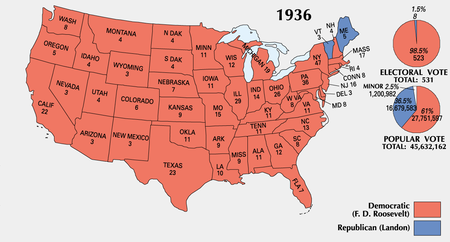U.S. presidential election, 1936
|
|
The Great Depression was still widespread at the time of the U.S. presidential election of 1936, and incumbent President Franklin D. Roosevelt was still working to push the provisions of his New Deal interventionist economic policy through Congress and the courts.
| Contents |
Nominations
Democratic Party nomination
The Democratic Party Convention was held in Philadelphia, Pennsylvania and overwhelmingly nominated incumbent President Franklin Roosevelt.
Republican Party nomination
The Republican Party Convention in Cleveland, Ohio nominated Alf Landon from Kansas. Landon ran on a moderate platform, accepting the need for some government involvement in the economy and opposed to the power of big business, but felt that the New Deal was corrupt and wasteful.
Other nominations
Although many people expected Huey Long, the colorful Democratic senator from Louisiana, to run as a third-party candidate with his "Share Our Wealth" program as his platform, his bid was cut short when he was assassinated in September of 1935.
It was later revealed by historian and Long biographer T. Harry Williams that the senator had never, in fact, intended to run for the presidency in 1936. Instead, he had been plotting with Father Charles Coughlin, a Catholic priest and populist talk radio personality, to run someone else on the soon-to-be-formed Share Our Wealth Party ticket. According to Williams, the idea was that this candidate would split the left-wing vote with President Roosevelt, thereby electing a Republican president and proving the electoral appeal of SOW. Long would then wait four years and run for president as a Democrat in 1940.
Prior to Long's death, leading contenders for the role of the sacrificial 1936 candidate included Senators Burton K. Wheeler (D-Montana) and William E. Borah (R-Idaho) and Governor Floyd B. Olson (FL-Minnesota). After the assassination, however, the two senators lost interest in the idea and Olson was diagnosed with terminal stomach cancer.
Father Coughlin, who had allied himself with Dr. Francis Townsend, a left-wing political activist who was pushing for the creation of an old-age pension system, and Rev. Gerald L.K. Smith, a well-known white nationalist and spokesman for the Christian Right, was eventually forced to run Congressman William Lemke (R-North Dakota) as the candidate of the newly-created "Union Party." Lemke, who lacked the charisma and national stature of the other potential candidates, fared poorly in the election, barely managing 2% of the vote, and the party was dissolved the following year.
General election
Campaign
The election was held on November 3, 1936.
This election is notable for the Literary Digest poll, which was based on 10 million questionnaires mailed to readers and potential readers; over two million were returned. The Literary Digest, which had correctly predicted the winner of the last 5 elections, announced in its October 31 issue that Landon would be the winner with 370 electorial votes. The cause of this mistake is believed to be due to improper sampling: more Republicans subscribed to the Literary Digest than Democrats.
That same year, an unknown pollster named George Gallup predicted that Roosevelt would win the election, based on a random sample of 50,000 people. This correct prediction led to Gallup's later fame and respect in predicting the outcome of elections.
Roosevelt won reelection by a wide margin; while the country was still suffering from the Great Depression, most voters thought Roosevelt's progressive programs were more likely to improve the situation than a return to a Republican administration. Roosevelt's 60.8% of the popular vote is the second-largest percentage in U.S. history after Lyndon Johnson in 1964, and his 98.5% of the electoral vote is the fourth-largest in U.S. history after George Washington's two unanimous wins in 1789 and 1792 and James Monroe's unopposed race in 1820. (It has also been noted that Roosevelt won the second largest number of electoral votes in history, but that reflects more on the fact that the Electoral College didn't have 523 electoral votes to win until 1912.)
Results
Template:Start U.S. presidential ticket box Template:U.S. presidential ticket box row Template:U.S. presidential ticket box row Template:U.S. presidential ticket box row Template:U.S. presidential ticket box row Template:U.S. presidential ticket box row Template:U.S. presidential ticket box row Template:U.S. presidential ticket box other Template:End U.S. presidential ticket box
Source: U.S. Office of the Federal Register (http://www.archives.gov/federal_register/electoral_college/scores.html#1936)

